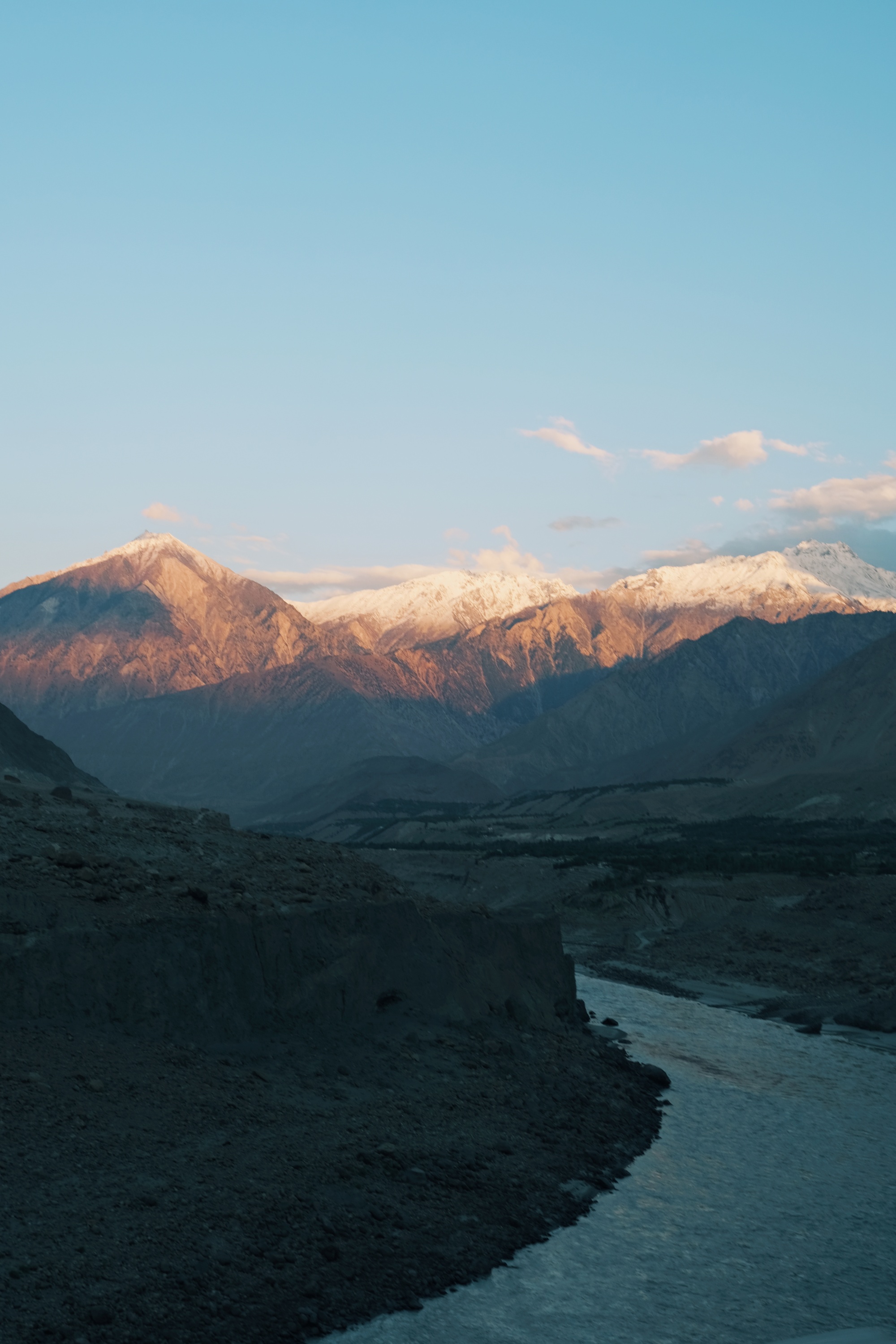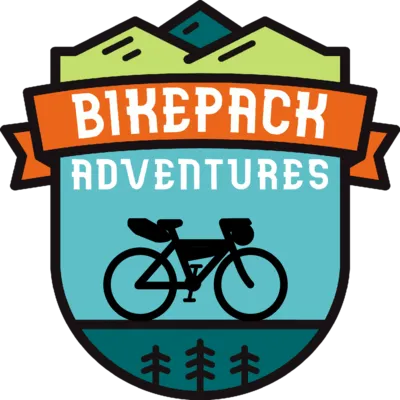I landed in Karachi in the early hours of Monday morning, bleary-eyed after an extremely stressful flight. Heavy rain in the UK that morning had left my cardboard box soaked and well over the weight limit, adding a few hundred pounds to the cost of my flight. I think my name was called on the tannoy as we boarded, though it sounded like “Mr Edwards” - one of my middle names - and I wasn’t entirely sure it was me. I spent the day convinced that at least one of my three checked bags wouldn’t arrive. Miraculously, they all did, albeit ripped open and left ajar, presumably by UK customs.
Karachi definitely felt like a step up in travelling difficulty. I was safe enough, but the city had the rough edges of Amman, Jordan, if Amman had taken up smoking crack. The ever-present smell of faecal matter hung in the air, mingling with cascading electrical wires, stray dogs humping in the streets, and the warm smiles of locals, framed by an oppressive desert heat. It was chaos, beautiful chaos, and after days spent hunting for a working ATM that accepted foreign cards, I packed and left. The police told me it was too dangerous to cycle out of Karachi, so I boarded a train heading north to the Capital Islamabad, where I could finally begin riding.


The first day out of Islamabad was stunning, with lots of pushing up and over the mountains that ring the city. In the evening, I was stopped by men wearing all black standing roadside in the dark, claiming to be police officers. In broken English, they demanded my passport and warned of terrorists in the area, instructing me to return to Islamabad immediately. After a long back-and-forth, and after looking over my passport multiple times, they reluctantly allowed me to search for a hotel. I was quoted the equivalent of $80 for the smallest room in a completely empty hotel complex. This wasn't an option. I was incredibly grateful when one of the hotel workers, unable to speak English, kindly offered me a place at his home. We communicated with gestures and bad translations from an uncle. It was a small act of generosity amidst the chaos and meant I could finally rest. Later that night, the police descended on this man's house, telling him he's in trouble for sneaking a foreigner into his house. The kind man sweats, and I sat there feeling incredibly guilty. To my surprise, the officers that arrived were warm and friendly. "Those police you spoke to are illiterates," one said. "No terrorists here. Come with us, we have a guesthouse at the station’. Thankfully, no trouble came to my kind host.
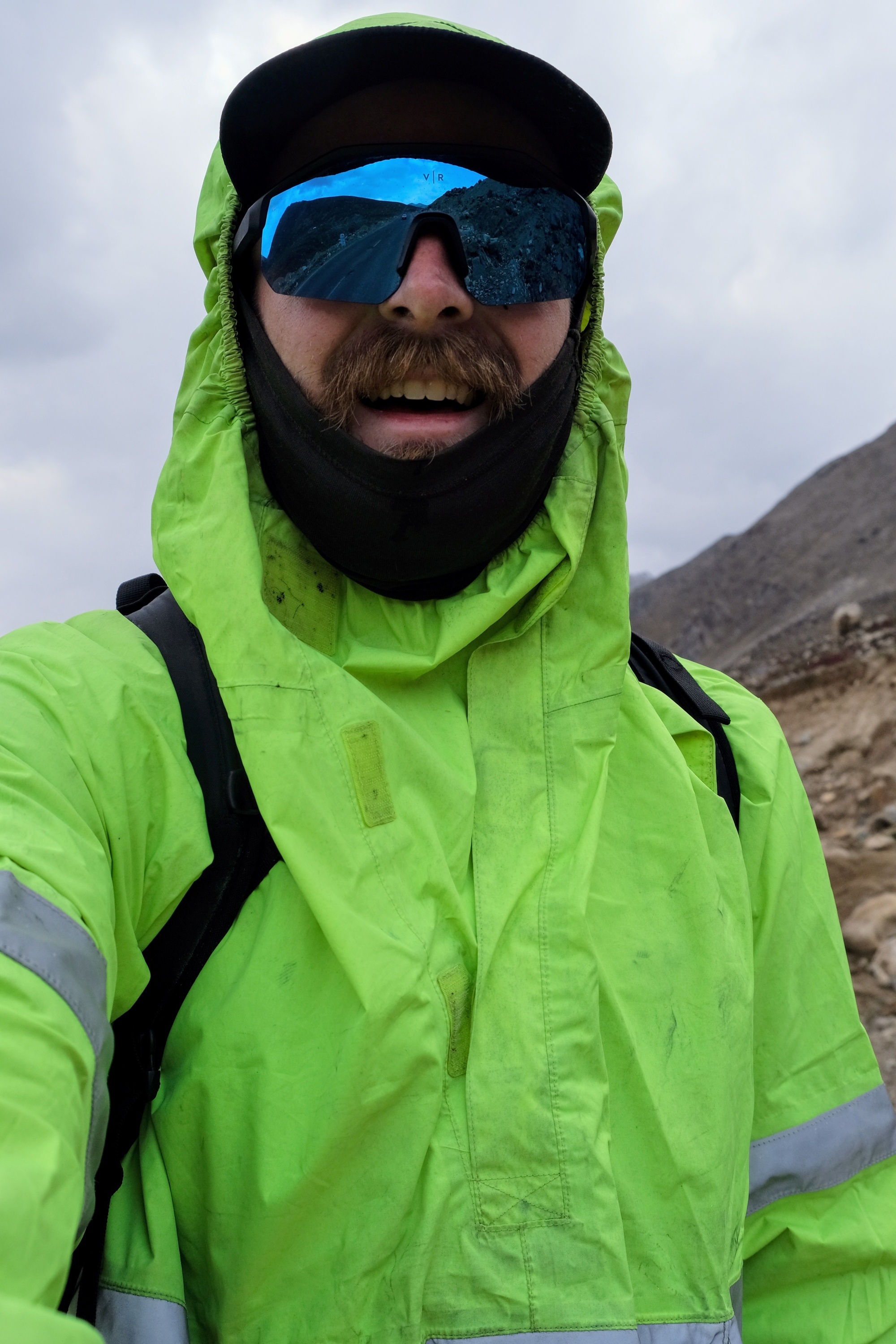
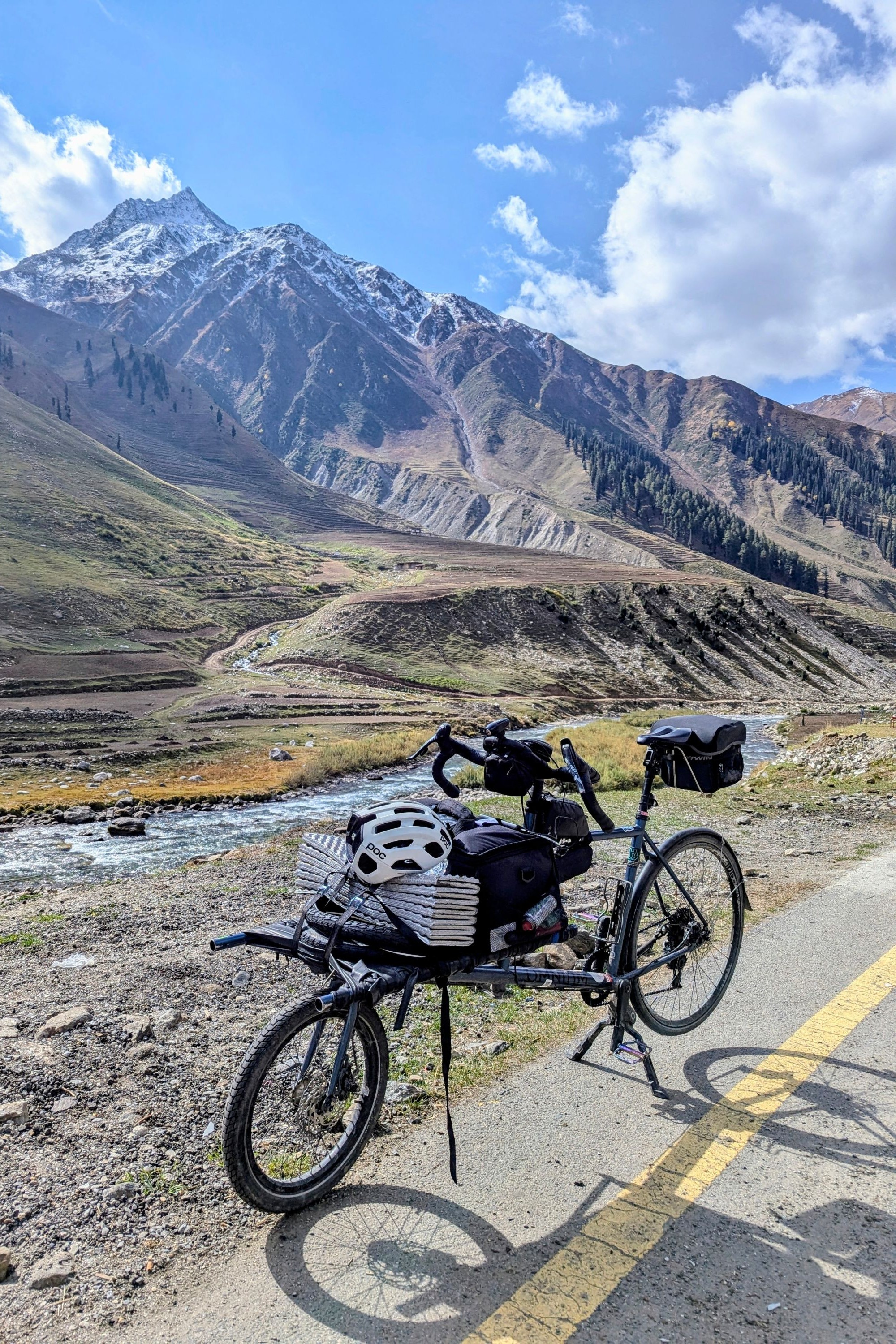
The days that followed were a blur of mixed messages and shifting moods from the police. One moment they assured me I could camp with their colleagues in the next town; the next, they insisted I book a hotel. I'd comply, only to have them follow me and berate the hotel owners for not hiring 24-hour security to house a foreigner, causing tons of commotion, basically announcing to the whole town that there's a foreigner here. "You have to stay at hotel from my friend," they'd say, sending me hours of riding up a mountain pass to a worse and more expensive room with no security. Sometimes I could cycle freely, other times, I'd be convoyed in the back of a police van for 10km until the next police post, my bike collecting scratches as it was passed from pickup to pickup.
Eventually, I learned to be vague about my travel plans, and the police attention eased somewhat. The valleys before Babusar Pass were unexpectedly lush - deep turquoise lakes mirrored the sky, rivers thrashed over rocks with boundless energy, blasting by trash thrown in the river by some locals. Terraced fields clung to the slopes, wildflowers bursting in colour, and the air carried a scent of damp earth and pine, a fleeting reminder that these mountains lived long before the roads were carved through them.
The climb toward Babusar Top was brutal: twenty kilometres to the summit and a thousand metres of elevation. The night before, I camped at a roadside place called The Adventurers, a mix of huts, tents, and a small restaurant, where I met a Dutch cyclist heading the other way. He warned me that the weather window was closing fast, especially across the 4,000-metre plateau of Deosai National Park, where snow was already making travel impossible.
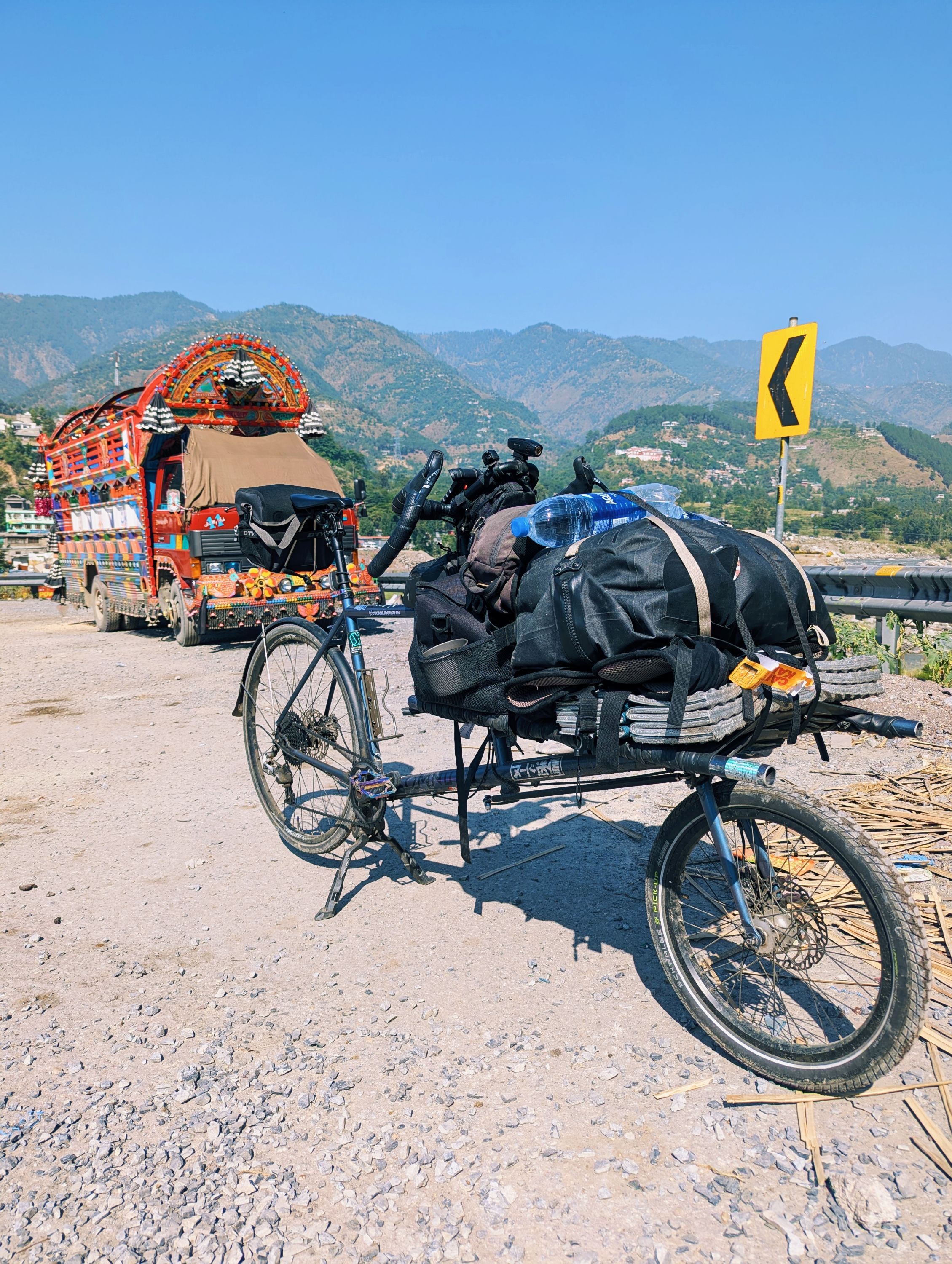
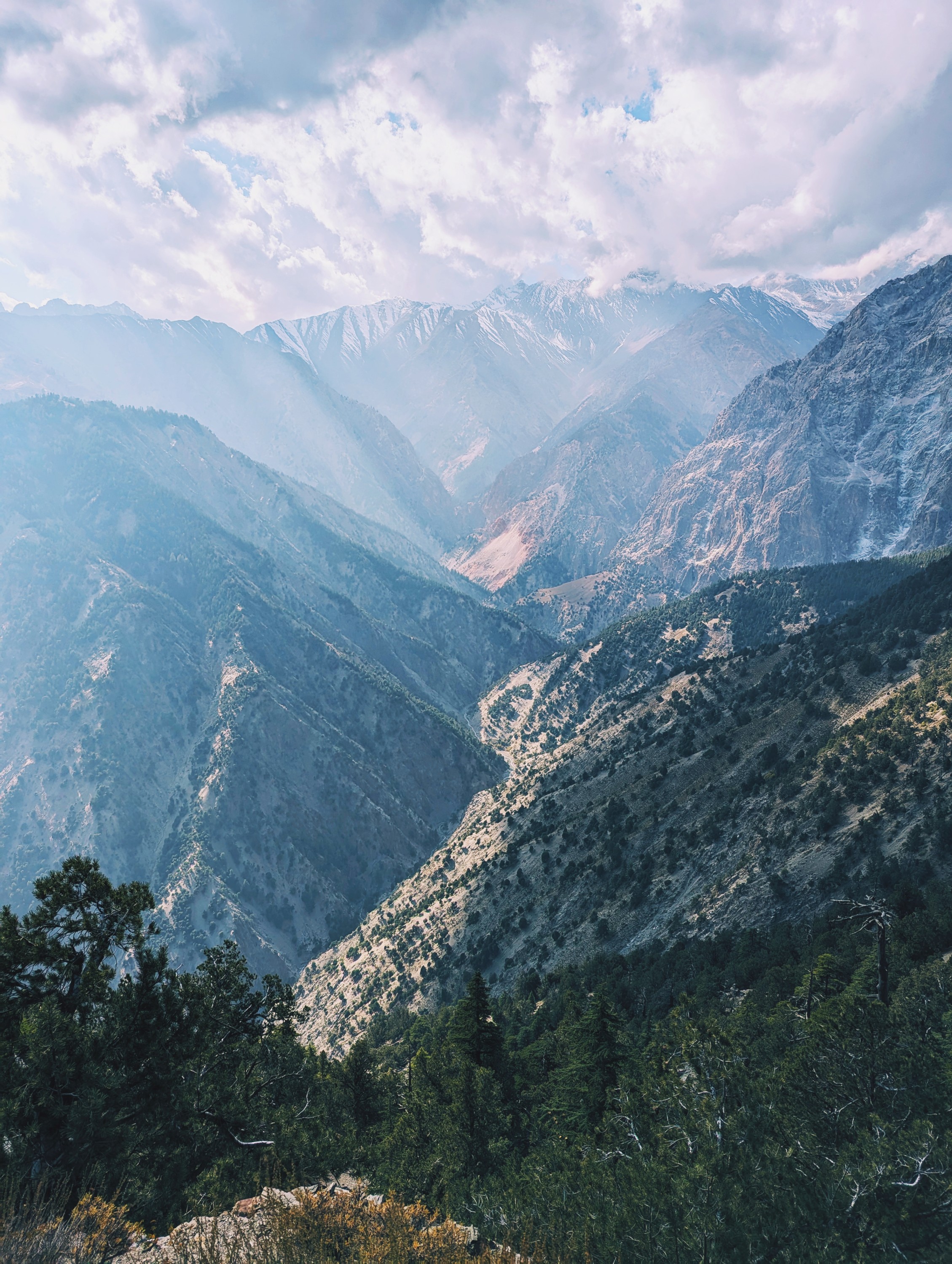
From my camp I set off carrying little more than water, crisps, and biscuits, assuming roadside stalls would appear along the way. They didn't. The green valley faded, surrendering itself to gray, windblasted rock and scree. The first half was manageable, but the final ten kilometres were the hardest of my life. I would push the bike ten metres, stop, lean on the handlebars, lungs clawing for oxygen. My limbs were heavy, my kidneys throbbed, and every step screamed at me to collapse and sleep. Cars slowed as they passed - some to wave, some to film, unaware the state I was in, beneath so many layers of clothing and a covered face. One family handed me water and almonds, which I crab-clawed into my mouth like a starving animal. Another car, already packed with five people in the back, insisted on helping. They lifted the front of my cargo bike into the back of the car, with two people each pulling metal poles of my front cargo bike bed, the rear wheel bouncing over scree that had fallen in the road, as we sped the last kilometres to the top of the pass. The last brutal kilometer disappeared in a minute, and I profusely thanked the family as I waved goodbye with my still frozen claw hands.
At 4,173m, the police swept me into a hut to thaw over a fire of burning plastic. I thought the ordeal was over. I'd eat, descend, and roll into civilization. Instead, they refused to let me go, funneling me into a filthy, overpriced hotel owned by one of their friends. This would prove to be my only reward for dragging myself over the highest point of the highway. The centerpiece of the room was a used diaper left open on the bathroom floor. The police arranged an escort for my descent at nine o’clock the next morning. At precisely six-thirty, my door was kicked in. The lock was flimsy and didn’t hold, and the officer I had seen on the pass the day before came stomping into my room, pointing an AK-47 at me and shouting, “WE LEAVE, NOW!” I was half asleep, still in my underpants, and in shock. I stuttered, asking for five minutes, but he barked back, “NO FIVE MINUTE, NOW!” I shut the door properly, dressed as quickly as I could, and opened it again with my camera in hand, furious. My voice cracked as I called them “fucking morons,” saying in the simplest English I could manage: “I was told nine, and you kick my door now? Fucking idiots!” Of course, none of it landed. I coasted downhill with the door-kicking mouth-breather following, while I would pause for no reason other than to irritate them.
Watch the video below to hear some of my insights into the region, police and country.
At the next checkpoint, the pattern repeated: police ready to bundle me into a van, to “escort” me further. I grabbed my bike, determined to go alone, and pushed aside of the chief of police who tried to stop me, shouting, “THE POLICE ONLY MAKE PROBLEMS, I’M GOING ALONE, FUCK THE POLICE!”. In the heat of the moment this felt courageous, but in retrospect, laughably cringe. I ended up taking a turn to the right - not the route I had originally planned, but there was no going back. Hiding behind rocks at corners, I managed to evade them for nearly an hour.
The landscapes shifted again, barren, rocky slopes gave way to alpine meadows, icy streams trickled from melting snow, and cliffs dropped sharply into river valleys below. Dust coated my chain and cassette, slowing me so much that pushing the bike was sometimes faster than riding.
Eventually, I caught a window of freedom. A lorry pulled over, asking if I wanted a lift up the climb I had been walking. I accepted gratefully. The lorry bumped along the rocky road, its cargo filled with huge foam plates, my bike pressed into them. We smoked cigarettes while trading broken conversation. I crouched low when we passed police checkpoints, hiding while the two truckers kept it real, understanding my situation. Hours later, the mountains flattened slightly, the lorry slowed, and they refused the few thousand rupees I offered as thanks. I stepped out, my bike intact, the peaks fading behind me. I was in the city of Gilgit - ferried to safety by two selfless locals whose generosity made the entire ordeal worth it.
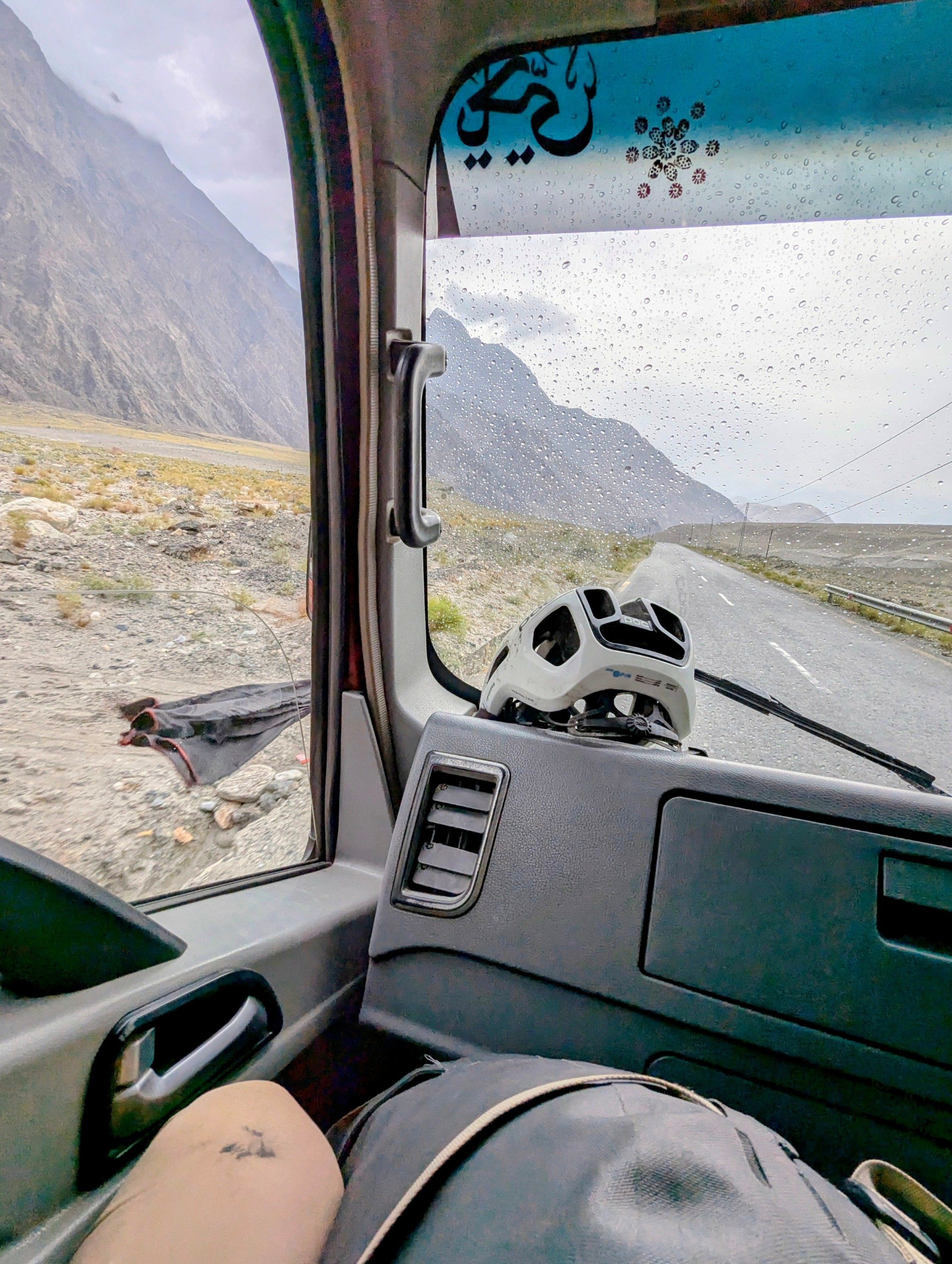

The mountains tested me. The police tested me harder. But the kindness of strangers pulled me through. Looking back, the whole thing was absurd - being “escorted” through terrain with no real danger, in large part due to regular police stops on the only road, only to be ferried to real safety by strangers in a foam-filled lorry. It didn’t make sense, but it was unforgettable. Pakistan’s north isn’t just a test of endurance; it’s a place where chaos and kindness collide, sometimes at the same time. All you can do is hold on, push forward, and try to claw almonds into your blue lips.
